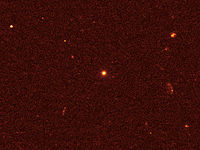GRB 110328A
GRB 110328A是由雨燕卫星于2011年3月28日探测到的伽玛射线暴(gamma-ray burst,GRB),这也是在至今探测到持续时间最长的一次伽玛射线暴[3]。这次伽玛射线暴发生在天龙座一个小星系的中心,距离地球约38亿光年[4]。
| GRB 110328A | |
|---|---|
 哈勃太空望远镜拍摄到的GRB 110328A | |
| 發現 | |
| 發現時間 | 2011年3月28日 |
| 發現人 | 雨燕卫星 |
| 持續時間 | 数月至一年[1] |
| 位置 | |
| 赤經 | 16h 44m 49.97s |
| 赤緯 | +57° 34′ 59.7″[2] |
| 紅移 | 0.35 |
| 距离 | 38亿光年 (920 Mpc) |
| 星座 | 天龙座 |
| 能量 | |
| 總能量輸出 | 5×1048 爾格 |
| Other designations | |
| GRB 110328A , Swift J164449.3+573451 , Sw 1644+57 | |
| 參見伽瑪射線暴、分類:伽瑪射線暴 | |
科学家认为这种极端异常的能量释放,可能是由星系中心附近一个大质量黑洞利用其强大的潮汐力撕裂了一颗靠近它的恒星引发的,黑洞产生了两束剧烈的喷流,而其中一束恰好正对着地球[5][6][7]。
参考资料 编辑
- ^ Gamma-ray flash came from star being eaten by massive black hole | e! Science News. 2011-06-16 [2011-06-17]. (原始内容存档于2020-10-21).
- ^ NASA Telescopes Join Forces to Observe Unprecedented Explosion. HubbleSite. [2011-04-21]. (原始内容存档于2012-05-12).
- ^ Smith, Stephen. Down the Barrel. 2011-04-11 [2011-04-22]. (原始内容存档于2020-07-11).
- ^ GRB 110328A: Chandra Observes Extraordinary Event. Harvard-Smithsonian Center for Astrophysics. [2011-04-21]. (原始内容存档于2012-05-12).
- ^ Barres de Almeida and De Angelis. Enhanced emission from GRB 110328A could be evidence for tidal disruption of a star. arXiv:astro-ph. 2011-04-13.
- ^ Coco, Alejandro. The Most Intense Cosmic Explosion Ever Seen. Scienceray. 2011-04-10 [2011-04-22]. (原始内容存档于2012-07-15).
- ^ University of California, Berkeley. Unusual gamma-ray flash may have come from star being eaten by massive black hole. PhysOrg. [16 June 2011]. (原始内容存档于2019-10-16).